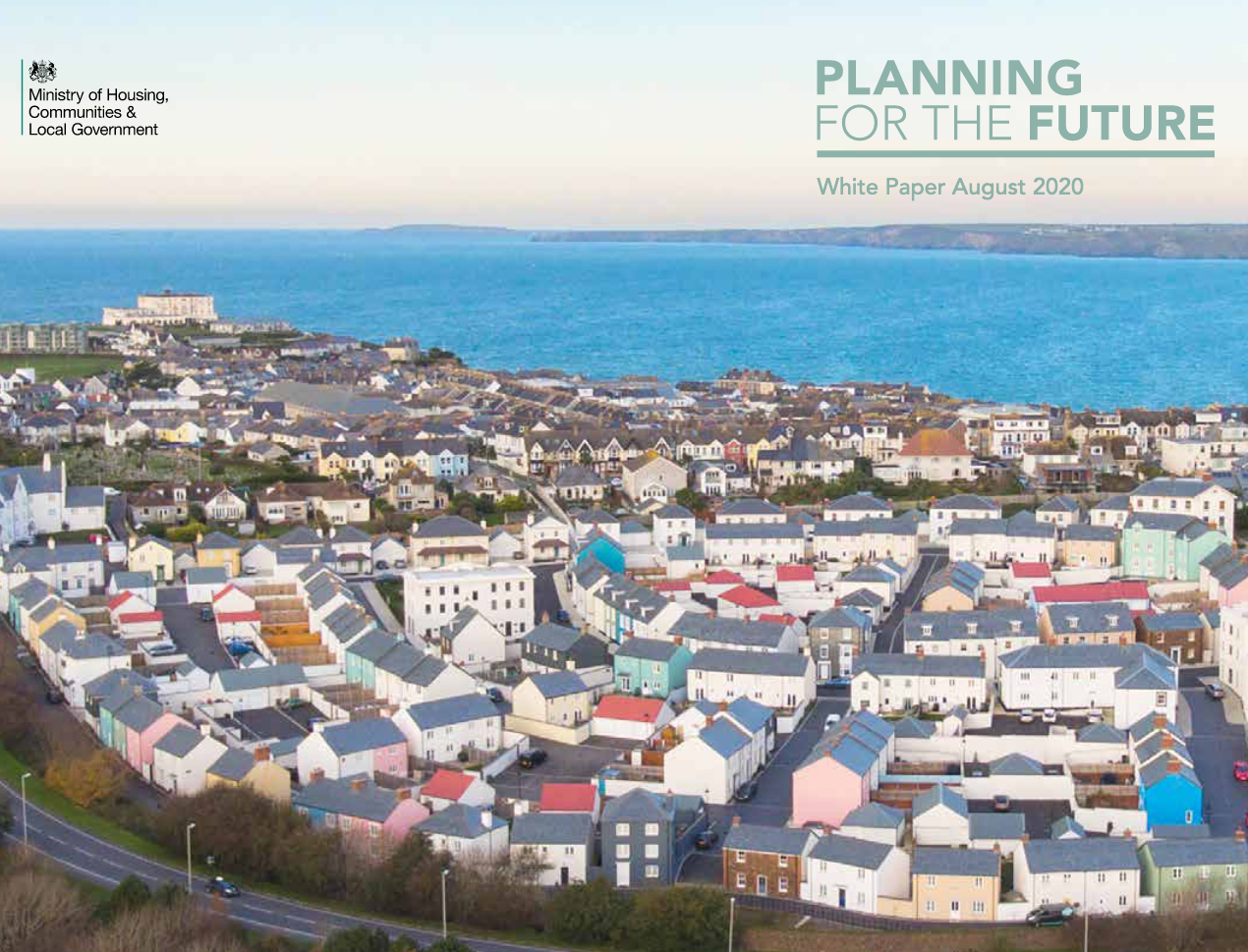 Abraham Lincoln
If given the truth, the people can be depended upon to meet any national crisis...
Abraham Lincoln
If given the truth, the people can be depended upon to meet any national crisis...
 Guildford news...
for Guildford people, brought to you by Guildford reporters - Guildford's own news service
Guildford news...
for Guildford people, brought to you by Guildford reporters - Guildford's own news service
Opinion: Pushing More Building Into the South-east Will Be An Electoral Kiss Of Death For The Party That Forces It
Published on: 25 Aug, 2020
Updated on: 1 Sep, 2020
I’ve just read the government’s White Paper “Planning for the Future”, all 84 pages of it. What’s more, I enjoyed it, with lots of pretty pictures and excellent prose.
Admittedly, there’s a strong gust of windy rhetoric, especially in the Prime Minister’s foreword. You have to get to page 20 before the government actually says what they want to do. And there’s the usual gimmicky language about how everything is going to be revolutionised by IT.
But it’s hard to fault the Paper’s analysis or many of its conclusions. The media’s description of it as a “developer’s charter” is a tad unfair. Not for the first time under this, our most ideological and right-wing government in history, I throw bouquets to the sensible civil servants who wrote it.
The summary of proposals on pages 20 to 23 could yet change for the worse, and a multitude of devils cavort in the detail. But who can query the Paper’s basic diagnosis that our planning system is deeply dysfunctional or the PM’s call to “tear it down and start again”?
R4GV believe the White Paper is an opportunity to rethink Guildford’s dodgily adopted Tory Local Plan. The borough council now needs to turn this into a bankable commitment and get seriously to work. The local parties and any resident can start by responding to the government consultation before the October 29 deadline.
 Bodies with the public interest at heart need to win the argument. England’s over-mighty development lobby will not be slow off the mark to comment. And don’t underestimate the vested interests of the priesthood of planning consultants, inspectors and council officers that has burgeoned since the present system began in 1947.
Bodies with the public interest at heart need to win the argument. England’s over-mighty development lobby will not be slow off the mark to comment. And don’t underestimate the vested interests of the priesthood of planning consultants, inspectors and council officers that has burgeoned since the present system began in 1947.
With their diplomas in town and country planning, some from obscure universities, their stranglehold on the planning process and ability to bamboozle and outsmart the people, councillors included, add up to a scandal that ranks alongside the medieval sale of indulgences. Any meaningful change to the planning system must sweep them away.
The White Paper’s basic idea of splitting England into zones for “growth, renewal and protection” may help focus minds.
Protection: with two-thirds of Guildford’s villages ejected from the green belt under the Local Plan, there must be no more compromise. In terms of recreation, tourism, education, mental health, food security, clean air, water conservation, flood defence, climate-change mitigation and many other values, the countryside has a quantifiable, acre-by-acre value. But when do planners ever use the hard arithmetic to balance against the professed value of new development?
Renewal: reduced by online shopping, home-working and Covid to a decaying, Victorian mess, much of our town badly needs regeneration. Some residents still seem blind to the extent of this accelerating decline.
Growth: after the global financial crash, the policy of the former Tory council, egged on by business, was to promote Guildford as a regional “growth hub”, with an over-expanded university, monster distribution warehouses and low-value jobs. But continuing to out-compete the North and Midlands is now incompatible with the government’s “levelling up” agenda for the regions. Guildford needs to persuade ministers that a happy future for the most prosperous, congested part of the country lies in unforced organic growth.
The borough council also needs to challenge the White Paper’s most stupid proposal, top-down house-building targets “focused on areas where affordability pressure is greatest”. This commits the naive mistake of supposing house prices are set by simple supply and demand. Maybe this applies to Norwich or Carlisle, but not to Guildford.
Here, prices have more to do with the cost of capital (at present virtually zero) and other factors, such as artificial government stimuli, mass commuting and the proximity of London, still awash with overseas property speculators, criminal and otherwise, and their greedy support industry of property lawyers and middlemen.
Pave over the Guildford green belt but, 30 miles from central London, you will never, ever build your way out of inflated house prices. Forcing building into the South East will be an electoral kiss of death to whichever party pushes for it, and will merely aggravate the North-South divide that “levelling up” is supposed to solve.
With R4GV, luck and timing played a huge part in their success at the last local elections. To pull it off again next May, they need to prove two things. First, that they are a coherent force and not just a bunch of drop-out Tories and Lib Dems, parties with national resources that are busy regrouping. Second, that they care as much about the V as the G in their name and are not biased towards urban concerns.
GGG needs to convince all residents, urban as well as rural, that the Tory Local Plan is not the end of the story but makes protecting the countryside more, not less, important. Indeed, this is the only way to steer developers towards reviving the town, something that will take considerably more intelligence and money than the soft option of concreting over green fields.
Responses to Opinion: Pushing More Building Into the South-east Will Be An Electoral Kiss Of Death For The Party That Forces It
Leave a Comment Cancel reply
Please see our comments policy. All comments are moderated and may take time to appear. Full names, or at least initial and surname, must be given.
Click on cartoon for Dragon story: Public Asked for Views on SCC’s Proposal for Reduced Speed Limits




Recent Articles
- Letter: Normandy Proposal Needs A Proper Services Audit
- Notice: Free Bereavement Support Programme
- Normandy Housing Plan Reignites Concerns Over ‘Damage To Our Community’
- Letter: The Class of 1955 Meets 70 Years On.
- Highways Bulletin: Reimagining Parking with Green Design
- Opinion: Never Have We Needed the Benefits of the Natural World More
- SCC Calls on the Government To Protect the Environment
- Two-Week Road Closure on Portsmouth Road for Gas Network Upgrade
- Charlotteville Cycling Club Organises Another Successful Race Event
- Waverley Council To Bring Green Space Maintenance In-house



Recent Comments
- Richard Cooke on Letter: Snail-paced Progress for Full Weir Repair
- Bethan Moore on Guildford’s First “Bike Bus”
- Andy Friend-Smith on Guildford’s First “Bike Bus”
- Peter Mills on Guildford’s First “Bike Bus”
- Des Flanders on Making History As Pewley School’s Class of ’54 Hold Their Final Reunion
- Margaret Rotherham on Guildford Festival Burst with Colour, Culture and Community Spirit
Search in Site
Media Gallery
Dragon Interview: Local Artist Leaves Her Mark At One of England’s Most Historic Buildings
January 21, 2023 / No Comment / Read MoreDragon Interview: Lib Dem Planning Chair: ‘Current Policy Doesn’t Work for Local People’
January 19, 2023 / No Comment / Read MoreA3 Tunnel in Guildford ‘Necessary’ for New Homes, Says Guildford’s MP
January 10, 2023 / No Comment / Read More‘Madness’ for London Road Scheme to Go Ahead Against ‘Huge Opposition’, Says SCC Leader
January 6, 2023 / No Comment / Read MoreCouncillor’s Son Starts Campaign for More Consultation on North Street Plan
December 30, 2022 / No Comment / Read MoreCounty Council Climbs Down Over London Road Works – Further ‘Engagement’ Period Announced
December 14, 2022 / No Comment / Read MoreDragon Interview: GBC Reaction to the Government’s Expected Decision to Relax Housing Targets
December 7, 2022 / No Comment / Read MoreHow Can Our Town Centre Businesses Recover? Watch the Shop Front Debate
May 18, 2020 / No Comment / Read More







Jim Allen
August 25, 2020 at 12:35 pm
Simple question. Why make getting planning applications easier, when it is the 1 million applications not built out which is the problem?
Jules Cranwell
August 25, 2020 at 1:27 pm
This is the most insightful analysis I have read on the dangers of the local plan, and the ‘new normal’ since it was pubished.
GBC councillors should read this over and over again, until they ‘get it’. Some already do, including GGG, and some of those in R4GV.
There was a Tory MP on the Today Programme this morning arguing that our towns should concetrate on urban redevelopment, and exploit the endless supply of retail and office space being left empty each and every day, thus protecting our rural areas, and farmland.
John Perkins
August 25, 2020 at 4:31 pm
Thank you Mr. Roberts for this thoughtful analysis.
I wish to add one more consideration. Thames Water recently warned that they might not be able to cope with an anticipated 20% rise in water usage during the heatwave. Cromer and other places were warned that they too might run out of water. In 1976, when the population was about 17% lower, there were standpipes in the street during a heatwave. The Local Plan allows for an increase of more than 20% in housing.
It doesn’t matter who puts in the pipes: where will they get the water from?
Kathleen Parrish
August 25, 2020 at 7:10 pm
We need more green fields and trees not more concrete and increasing population.
Harry Eve
August 25, 2020 at 9:25 pm
There could be a Kiss of Life for the party that reverses the changes to the Green Belt and settlement boundaries imposed by the Guildford Conservative Association.
Such a party would be demonstrating that it took environmental concerns seriously and was not satisfied with the substandard evidence used to justify the Local Plan.
Peter Ambrose
August 27, 2020 at 11:27 am
It seems a bit odd to celebrate “our most ideological and right-wing government in history” and then complain about development in the South East.
If there’s one key defining feature of right wing ideology, it must be a belief that more decisions should be left to the markets, and right now the housing market wants to plaster the South East with homes because that’s where the big profits are.
Every government since 2010 has been pushing more housing in the South East and the Conservatives keep getting re-elected, so clearly it isn’t a kiss of death as the headline claims.
John Perkins
August 28, 2020 at 11:33 am
A market might be described as somewhere buyers and sellers get together to exercise their choices: sellers choose what they hope to sell and buyers choose whether or not to buy what’s on offer.
The housing market does not want “to plaster the South East with homes” – developers and government do. Actually, it’s the same story across the country, though only in places where big profits are to be made.
Government pushing for more housing is not an expression of market forces any more than is making people wear masks; it’s edict. The Government decides we need these things then makes it so that we shall have them, like it or not.
It’s obvious that the Conservatives were elected last year primarily on the issue of the EU (or perhaps more accurately, the other parties were not elected for that reason). They will lose some of that support at the next election even if they make a success of it and will lose a lot more if they fail.
Locally, the Conservatives were given a drubbing at the last election simply because their support deserted them – and that pattern was repeated across the country. All that kept them from disappearing completely was a lack of enthusiasm for their opponents. At some point the same attitude can be expected to apply at a national level, as it was in 1997.
My opinion is that they are planning for it and want to get their building done before it happens.
David Roberts
August 27, 2020 at 7:04 pm
Who’s celebrating, Peter? I deplore it. The much-abused civil service is the only thing currently holding the country together.
Stephen Page
August 31, 2020 at 3:41 pm
The problem for any government is to try and find balance with the issue of population growth and deal while having limited resources and finite funds. Population growth is making huge demands everywhere and Guildford is no different.
I’ve read about “Tory this” and “Tory that’, however, any incumbent government has to deal with exactly the same problems and we have to accept that if we are happy with large-scale immigration, with no restrictions, then they will require housing and the services to go with it.
But isn’t it about time we have a grown-up conversation about overpopulation? Do we really want to strip our nation’s wildlife of its natural habitats? Do we really want to concrete over the rest of our countryside? From the way we have failed to address population levels on our small island I can only assume that we do.
So if that’s the case, we now have to take ownership of the problem: moaning about the political parties who are having to deal with the nation’s inability (or is it cowardice?) to hold a conversation about immigration is both lazy and simplistic.